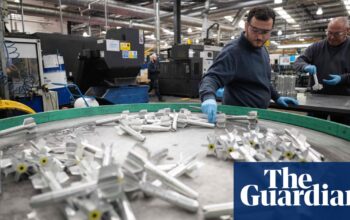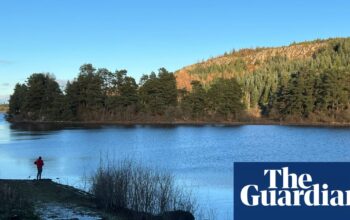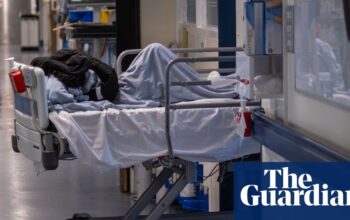I think what’s really important is dispelling the misunderstandings and myths around what are you really afraid of, what is this doing to your society.
It’s been very distressing. I think people have been really really upset and really worried and also terrified about what they saw at Southport.
You know the fact that this was a fake news story and … was so quickly vilified to an extent that these mobs and thugs were coming out to target a mosque, and now we’ve heard lots across social media of more planned attacks. It’s really so coordinated. I think people have been really really upset.
There seems to be this really strong undercurrent of Islamophobic hate, anti-immigrant hate and that’s really boiling up … and the law and order approach isn’t going to tackle that.”
She added:
We are part of a wonderfully diverse Britain and that works because all of us are working together and this constant demonisation and choosing the framing around mosques isn’t actually true.
They’re you’re neighbours, they’re your friends.”
Keir Starmer on Thursday to expand the use of live facial recognition technology would amount to the effective introduction of a national ID card system based on people’s faces.
Silkie Carlo, the director of Big Brother Watch, said it was ironic the new prime minister was suggesting a greater use of facial matching on the same day that an EU-wide law largely banning real-time surveillance technology came into force.
“Expanding live facial recognition means millions of innocent Britons being subjected to automated ID checks,” said Carlo. “These are the surveillance tactics of China and Russia and Starmer seems ignorant of the civil liberties implications.”
Live facial recognition has, until now, largely been used in the UK by the Metropolitan police and south Wales police, as a real-time aid to help officers to detect and prevent crime, including at public events such as last year’s coronation. It is capable of scanning more than 100 faces a minute for identification.
But on Thursday, Starmer suggested that it should be deployed more widely, in response to the violent disorder around the country after the stabbing and murder of three girls in Southport, Lancashire.
Promising to create a national police capability to tackle the rioting, the new prime minister said forces needed to work better together, sharing intelligence and engaging in a “wider deployment of facial recognition technology”.
You can read the full piece here:
Tory leadership hopeful Robert Jenrick has condemned “far-right” organising of riots across the country and said “if there is a case” for proscribing the EDL it should be “considered.”
He said the violence across the country must be “condemned unequivocally across the political spectrum”.
Asked by BBC Radio 4’s Today programme whether he would also condemn the far-right organising as part of the disorder, Jenrick said:
Yes, absolutely. That there are elements of the far right apparently involved in these protests – we need to ensure that the police have all the support that they need.”
Repeatedly pressed on whether the EDL should be proscribed given former supporters appeared to be involved in the violence, he said:
If it meets the threshold for proscription, which is a high mark, then it definitely needs to be considered.”
Jenrick said he did not regret the rhetoric used by him and his party over immigration.
Asked whether he regretted using the slogan “stop the boats” and similar language, the former Home Office minster said:
No absolutely not. I think you’re looking at this in completely the wrong way.”
He added:
There are concerns amongst millions of people in our country – legitimate concerns – about mass migration, about illegal migration. You do not channel those concerns through violence obviously.
But neither should we as politicians or indeed you as the media brush those concerns under the carpet, because that only makes the problem worse.”
It was put to him that the Tory government he served in oversaw a record-breaking high in net migration, to which he replied:
I was the minister who argued consistently to reduce the number of people coming here illegally.”
Former home secretary, Priti Patel has criticised the government’s reponse to the rioting that taken place across the country after Monday’s Southport attack, and said that that parliament “must be recalled immediately”.
In a post on X, the Conservative MP, wrote:
The events we have witnessed overnight in Sunderland were totally unacceptable. As they were in Southport earlier this week and in Harehills in Leeds a fortnight ago.
We should never excuse, or be apologists for, disorder whoever is responsible. Violence and thuggery is always unacceptable. There is no qualification or exception. And politicians on all sides must be willing to stand up and say so.
Saying the nation is “braced for disorder” is not only breathtakingly complacent, but both troubling and inadequate. The government is now in danger of appearing to be swept away with events rather than maintaining control of them.
That is precisely why as home secretary I brought forward much stronger protections against disproportionate protest and disorder, in the teeth of fierce opposition. But it was the right thing to do and those powers must be used to their maximal extent now.
Now is a moment for national reflection and solidarity – to pull back from the wave of violence we have seen, to call it out for what it is – without fear or favour – and for parliament to speak with one voice in condemnation. We either believe in the rule of law, or we do not.
That is why parliament must be recalled immediately.”
Tory leadership hopeful Robert Jenrick has criticised Nigel Farage’s remarks about the Southport stabbings, saying they did not “make the situation better”.
Asked for his view on the remarks from the Reform UK leader, he told BBC Radio 4’s Today programme:
I don’t follow all the comments that Nigel Farage says but I don’t think any of us should be doing anything to make the job of the police more difficult at this time.”
Asked whether Farage’s comments had made the police’s job more difficult, he said:
I don’t think they made the situation better did they?
So I think we should all be choosing our words carefully, backing the police to the hilt and doing everything we can to ensure our streets are safe and this violence, which I’m worried is escalating, comes to an end as swiftly as possible.”
Mayor of the north-east Kim McGuinness confirmed that a police station had been set on fire in the Sunderland disorder.
Speaking on BBC Breakfast, McGuinness said:
I have spoken this morning to the chief constable of Northumbria police and I’m very grateful to them. What they had to put up with was real sustained violence.
We have seen police injured, we’ve seen 10 people so far arrested but I very much hope that we’ll see more of that throughout the day.”
She added:
You can see there’s really significant damage, they’ve set fire to a police station, to cars, they’ve looted shops, they’ve abused people in the street, they’ve attacked police officers and Sunderland will be feeling the effect of that.”
Speaking about the clean up in Sunderland after last night’s disorder, McGuinness said:
Things like this really affect the way that local people feel but the clean up overnight from Sunderland council has clearly been absolutely massive.
And what I’m really heartened by, alongside the thousands of people contacting me saying ‘this is not what we’re about, we’re about that love and that compassion’ is the fact that people in Sunderland are going to come together this morning and help with that clean up.
And I think that really shows the true spirit of what we are as the north-east and as Sunderland.”
Asked whether there was any specific knowledge of the events that were planned for Sunderland before, she replied:
We saw that these far-right groups were advertising what they called a peaceful protest yesterday in Sunderland.
That was anything but peaceful. It was out and out crime and violence and the police response was strong, protecting a mosque and really having to stand up to very sustained crime and violence from these thugs.”
A former police chief constable has urged people considering attending protests across the UK to “think very, very carefully before you go” about whether they want to “cause further pain and heartache to those beautiful little girls’ families”.
Former chief constable of Northumbria Police Sue Sim said the police were “well-trained” in disorder and would act and arrest those involved.
She told BBC Radio 4’s Today programme:
This incident is being used by people of an apparent far-right tendency to create mass disorder across this country all I can say is shame on you.
Those beautiful children’s deaths should not allow such violent disorder to occur.
To those considering attending, she said: ‘Do you want to cause further pain and heartache to those beautiful little girls’ families?’
Muslim, Jewish, Hindu and Christian leaders were among those calling for calm at any demonstrations this weekend, amid warnings of potential escalation of violent disorder.
Far-right unrest has – so far – spread to London, Sunderland, Hartlepool, Manchester and Liverpool after three girls were murdered and two adults and eight children seriously injured at a Taylor Swift-themed dance club.
Social media postings wrongly alleged the suspect was a Muslim asylum seeker, with a mosque targeted in Southport earlier in the week. A 17-year-old born in Cardiff, Axel Rudakubana, has now been charged with murder and attempted murder.
A group of more than a dozen imams coordinated by the Mosques and Imams National Advisory Board (Minab) joined forces with Christian and Jewish faith leaders in a show of solidarity outside the Southport mosque that was attacked earlier this week.
Qari Asim, Minab’s chair, said: “This is a time when we must stand firmly against opportunistic and shameful attempts to sow the seeds of division and hatred in our communities.”
The archbishop of Canterbury added to the calls for an end to violence, saying it was “completely unacceptable that Muslim and asylum-seeker communities are feeling so unsafe and I encourage people to reach out and support them”.
Umesh Sharma, the chair of the Hindu Council UK, said: “Whether it is mosques, mandirs or gurdwaras or churches – they should be left alone. Whatever anger, whatever frustration they have, it should not be shown on these buildings. These are places where we pray for all.
“If you want to protest, there are avenues, you can go protest at Hyde Park, Trafalgar Square, outside parliament.”
In Liverpool on Friday, the far right were outnumbered several fold by anti-fascist groups.
Minor scuffles early in the evening were quickly stopped by police and by 9pm only a handful of far-right protesters remained, standing under trees across the road from Abdullah Quilliam society mosque trying not to get rained on.
A group of men standing opposite the anti-fascists did not quite have the confidence to admit they were far right, telling the Guardian they had only “come for a look”, with balaclavas on.
Condemnation of the rioting in Sunderland has been widespread.
Sunderland Central MP Lewis Atkinson said he was “appalled” by disorder in the city centre.
Meanwhile, Sunderland AFC said the rioting was “shameful”:
The education secretary and Sunderland MP, Bridget Phillipson, described the unrest in the city as “unforgivable violence”.
Commenting on last night’s disorder, home secretary Yvette Cooper said:
Criminals attacking the police and stoking disorder on our streets will pay the price for their violence and thuggery.
The police have the full backing of government to take the strongest possible action and ensure they face the full force of the law.
They do not represent Britain.
Extra prosecutors were called in to work the weekend as police forces around the country brace for further disorder.
Stephen Parkinson, director of public prosecutions, said:
We take the recent incidents of violent disorder extremely seriously and we are ready to respond rapidly if there is a fresh outbreak.
We have deployed dozens of extra prosecutors who are working round the clock this weekend, supporting the police, and ready to make immediate charging decisions so that justice is swiftly delivered.
Here are some images from photographers on the ground in Sunderland last night:
The Sunderland protest was among several planned across the UK this weekend after the knife attack in Southport on Monday, fuelled by misinformation on social media about the background and religion of the 17-year-old suspect.
Anti-racism group Hope Not Hate said up to 35 protests were due to take place across the UK this weekend “under a broad anti-multiculturalism, anti-Muslim and anti-government agenda”.
They include Blackburn, Blackpool, Bolton, Bristol, Cardiff, Doncaster, Glasgow, Hanley, High Wycombe, Hull, Liverpool, Leeds, Leicester, Manchester, Newcastle, Nottingham, Portsmouth, Preston, St Helens, Stoke-on-Trent, Swindon and Wrexham.
Eight people have been arrested in Sunderland for offences including violent disorder and burglary after another night of rioting and disorder in parts of the UK.
Three police officers were taken to hospital after being injured, Northumbria police added. One had since been discharged.
At least one building was reportedly set on fire, and a car was also overturned and set alight as police struggled to control a crowd of several hundred protesters.
Some of the protesters wore balaclavas and some were draped in the England flag, with police officers being hit with beer cans and stones in the city centre and a nearby mosque on St Mark’s Road.Posting on social media about the building on fire, Nick Lowles, from the organisation Hope Not Hate, said: “A far right and racist protest has culminated in this. Shame on all those who continue to excuse these protests.”
It was initially reported that a police building had been set on fire but later reports suggested an adjacent building was instead set alight.
An overturned car was set on fire and rioters set off fire extinguishers against officers.
The protests, promoted by far-right activists on social media, had started at the newly refurbished Keel Square. Footage posted on social media showed young men throwing stones at police and shouting “Whose streets? Our streets” as well as Islamophobic chants.
Source: theguardian.com


